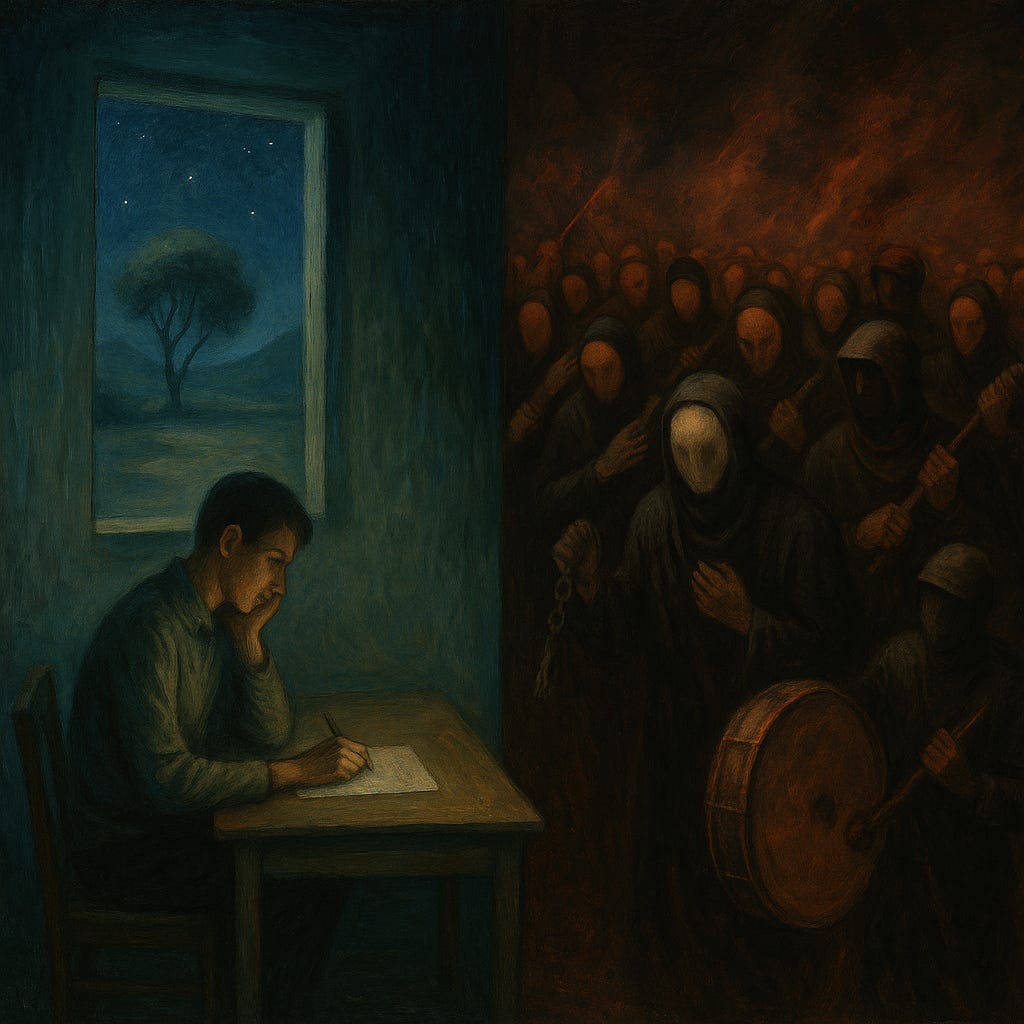Yesterday, we spent the day at a natural park called Sarab in Persian, the “origin of the water,” a natural spring near Songhor where cool, clear water pours from the foot of the Zagros Mountains. The place has a sacred feel to it—not from any religion, but from nature itself. The bid majnun, those elegant weeping willows, drape their branches over the banks of the stream like old souls. It’s quiet there. Soft. Timeless.
With me were my parents, grandmother, aunt, siblings, and their children. My four-year-old niece and nephew, Delaram and Kian, ran around laughing, curious and wild. I took them to the small shop nearby and let them choose a treat. They picked the same: lollipops and ice cream. But when we unwrapped them, Delaram saw that Kian’s lollipop was swirled with two colors—red and pink—while hers was just plain red. And suddenly, hers was no longer good enough.
“I want that one,” she said.
It didn’t matter that they were identical in taste and size. It didn’t matter what I explained. In her eyes, his was better—because it was his. Because it wasn’t hers.
And eventually, I gave in. I bought her another one.
But minutes later, both lollipops were tossed aside. Melting. Forgotten. It had never been about the candy. It was about comparison. About winning a game that neither of them could name but both were playing.
As I sat by the stream, I realized something heavy: we never really grow out of this.
We may age, get jobs, build lives—but so many of us are just Kian and Delaram in bigger clothes. We want what others have, even when what we have is enough. We crave symbols—bigger homes, newer cars, better titles—not for their use, but for the edge they give us in a silent, senseless race.
And as I watched them, it hit me: most of us never really grow up.
We think we do. We learn new words, get degrees, take jobs, buy homes. We call ourselves adults. But deep inside, many of us are just Delaram and Kian—still fighting over the color of a lollipop. We compare cars, salaries, partners, bodies. Even when what we have is perfectly fine, even beautiful, we can’t help glancing sideways. If someone else has a shinier version, ours feels suddenly dull.
I’ve done it too. I still do. That old part of me—the four-year-old—never really left. He just learned bigger words and put on a grown-up face.
This realization didn’t come to me in a classroom or a book. It came while sitting on the cool soil of Sarab, watching water emerge from the earth with a kind of ancient calm. The river doesn't compete with the mountain. The willow doesn't envy the stream. Only humans seem to live in constant contrast, unable to sit still without asking, “Do I have enough?” “Do I have more?”
But enough what, really?
The lollipops of adulthood just get more expensive. A house instead of a candy. A title instead of a toy. But the anxiety remains. And the hollowness when we get what we thought we needed? That remains too.
But this realization was interrupted.
As I sat in the stillness of thought, writing and reflecting, I began to hear the unmistakable sound of drums—, loud and deep. A procession was passing by.A mourning ritual for Imam Hussain honors his memory and legacy. Imam Hussain, the grandson of the Prophet Muhammad, is a central figure in Shi'a Islam. He is remembered for his martyrdom in the 7th century at the Battle of Karbala, where he supposedly stood against tyranny and injustice. His sacrifice has made him a powerful symbol of resistance and moral courage. Crowds of men dressed in black, some striking themselves with chains, some chanting in perfect rhythm. All of them united in grief, in costume, in purpose. Their faces were blank, serious, absorbed.
I watched them from my window—and I felt something shift.
Here were not children grasping for lollipops. Here were adults who had given up even that level of individual instinct. This wasn’t competition—it was submission. Not a child’s desire for more—but an adult’s erasure of self, absorbed into a grand narrative they did not write and cannot question.
And suddenly I wondered: is this what happens to us?
Do we grow from wanting different candy… to wanting the same grief? From comparing ourselves to others… to becoming indistinguishable from them? All wearing black. All mourning someone they’ve never met. All playing a role scripted centuries ago in a story they didn’t author.
A story that may not even be true.
And yet—it’s louder than my thoughts.
Maybe this is the final stage of surrender. Not to beauty, not to life, not to reason. But to faith—manufactured, inherited, unquestioned. It demands not only belief, but performance. Not only emotion, but synchronization. It replaces the chaos of wanting with the comfort of belonging. But at what cost?
As I sat there, caught between the memory of the spring and the sound of the street, I felt like I was watching two versions of humanity: one reaching for something more, even if misguided. The other letting go of the self entirely, becoming a shadow in a larger machine.
And I wondered—what kind of freedom do we want?
The freedom of a child, hungry and envious, but still alive with want?
Or the freedom of the faithful, dissolved into a story that numbs their hunger with meaning?
I don’t have an answer. But I know this: I’d rather sit by the stream at Sarab, and listen to the water write its own story, than march to a drumbeat that drowns out the voice inside me.

